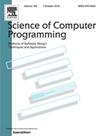Intrathread method orders based adaptive testing of concurrent objects
IF 1.4
4区 计算机科学
Q3 COMPUTER SCIENCE, SOFTWARE ENGINEERING
引用次数: 0
Abstract
Concurrent data structures or classes are designed to provide safe accesses and simultaneous updates by multiple threads to shared objects in a concurrent environment, with the goal of enhancing parallelism and throughput. However, testing concurrent objects poses significant challenges due to the potential explosion of concurrency test spaces, the variety of programming vulnerabilities, and the inherent nondeterminism of concurrent test executions. In this paper, we propose an Intrathread Method Orders based Adaptive Concurrency Testing (IMOACT) framework for concurrent objects. IMOACT can capture diverse behaviors of interthread method pairs through characterizing concurrent execution contexts with intrathread method orders. Moreover, IMOACT can adaptively optimize concurrent test executions by generating scheduling sequences based on the key scheduling points visited so far, streamlining test generation and execution organically across multiple tests. Experimental case studies with typical C/C++ concurrent classes demonstrate that IMOACT outperforms baseline approaches. On average, IMOACT promotes the effectiveness of detecting concurrency bugs by 65%, and achieves a speedup of 2.43x compared to the underlying state-of-the-art concurrency testing approach.
基于线程内方法顺序的并发对象自适应测试
并发数据结构或类旨在为多线程对并发环境中的共享对象提供安全访问和同步更新,其目标是增强并行性和吞吐量。然而,由于并发测试空间的潜在爆炸、编程漏洞的多样性以及并发测试执行固有的不确定性,测试并发对象带来了重大挑战。本文提出了一种基于线程内方法顺序的自适应并发测试(IMOACT)框架。IMOACT可以通过用线程内方法顺序描述并发执行上下文来捕获线程间方法对的各种行为。此外,IMOACT可以通过基于目前访问的关键调度点生成调度序列来自适应地优化并发测试执行,从而跨多个测试有机地简化测试生成和执行。典型C/ c++并发类的实验案例研究表明,IMOACT优于基线方法。平均而言,IMOACT将并发bug检测的效率提高了65%,与底层最先进的并发测试方法相比,速度提高了2.43倍。
本文章由计算机程序翻译,如有差异,请以英文原文为准。
求助全文
约1分钟内获得全文
求助全文
来源期刊

Science of Computer Programming
工程技术-计算机:软件工程
CiteScore
3.80
自引率
0.00%
发文量
76
审稿时长
67 days
期刊介绍:
Science of Computer Programming is dedicated to the distribution of research results in the areas of software systems development, use and maintenance, including the software aspects of hardware design.
The journal has a wide scope ranging from the many facets of methodological foundations to the details of technical issues andthe aspects of industrial practice.
The subjects of interest to SCP cover the entire spectrum of methods for the entire life cycle of software systems, including
• Requirements, specification, design, validation, verification, coding, testing, maintenance, metrics and renovation of software;
• Design, implementation and evaluation of programming languages;
• Programming environments, development tools, visualisation and animation;
• Management of the development process;
• Human factors in software, software for social interaction, software for social computing;
• Cyber physical systems, and software for the interaction between the physical and the machine;
• Software aspects of infrastructure services, system administration, and network management.
 求助内容:
求助内容: 应助结果提醒方式:
应助结果提醒方式:


